1994年关税与贸易总协定
《1994年关税与贸易总协定》第20条的历史进程pdf

《1994年关税与贸易总协定》第20条的历史进程在结束我们对《1994年关税与贸易总协定》第20条(g)款关于“保护”一词含义的讨论之前,让我们回顾一下该条款产生的历史进程以便确定我们对“保护”一词的解读是否准确。
一方面,关于《1994年关税与贸易总协定》第20条(g)款的初期谈判进程清楚地显示,谈判各相关方本没有使用旨在保护或促进国内相关产业之“保护性措施”的意图。
在1946年11月11日召开的筹备委员会“伦敦回合”谈判过程中,巴西提出的一项关于“允许对可耗竭自然资源实施出口限制措施(与此同时管控方对此类自然资源的国内生产和消费的限制不予实施)”的建议被否决。
在对该项建议的抗辩中,英国强调指出,“如果用于工业目的的出口限制不被允许则将有利于《联合国宪章》总目标的发扬光大”。
随后,在1950年世贸组织“数量限制工作组D”发布的工作报告重申了《关贸总协定(草案)》“不允许出于保护或促进国内相关产业的目的对原材料出口实施限制(无论是通过对其购买原材料的国内相关产业提供价格优惠还是削减提供给国外竞争对手此类原材料的供应量或其他手段)”。
另一方面,特别是从20世纪70年代以来,“自然资源的永久主权”原则被诸多发展中国家在《关贸总协定》框架内提及的频率不断增长。
例如,1979年,在对《关贸总协定》出口限制条款进行的“再评估”程序中,印度谈判代表指出:我们认为,当缔约方对《关贸总协定》涉及出口限制和税费条款进行“再评估”时,应坚持的两条基本原则分别是国家对其自然资源拥有主权和发展中国家有“以自认为最优的方式(包括原材料的加工、建立经济多元化的工业体系和对国内相关产业供应的保障)利用自有自然资源发展本国经济”的需要。
类似地,墨西哥坚持认为:就出口限制和出口税费而言,墨西哥代表团的观点是……对出口限制问题的任何思考和审查均应符合强调各个国家对其自然资源和全部经济活动享有充分永久主权的《联合国大会第3201号决议(S-VI) 》的总体要求。
关于的执行1994关贸总协定第6条地协议详情详情反倾销协议详情详情

关于执行1994关贸总协定第6条的协议(反倾销协议)第一部分第1条总则反倾销措施仅应在1994关贸总协定第6条所规定的情况下,并在按照本协议各项规定发起和进行调查后使用。
在根据反倾销法或条例采取行动的范围内1994关贸总协定第6条的适用按下列条款办理。
第2条倾销的确定1.在本守则中,如果从一国向另一国出口的产品其出口价格低于在正常贸易过程中出口国用于本国消费的相同产品的可比价格,则该产品便被认为是在被倾销,即被以低于其正常价值的价值输入到另一国的商业中去。
2.当出口国国内市场的正常贸易过程中不存在该相同产品的销售时,或者当由于该市场的特定情况,或者出口国国内市场的销售量太少,该项销售不允许进行适当比较时,则倾销差额应通过与向一个合适的第三国出口的相同产品的可比价格进行比较而确定,只要该价格是有代表性,或者与原产地国的生产成本、加上合理数额的管理费、销售费和一般费用以及利润进行比较而确定。
3.(1)只有当局确认相同产品在出口国国内市场上或者向一个第三国以价格低于单位(固定的和可变的)生产成本加行政管理费和销售费及一般费用的销售是在长时期内大量进行的且是以未能在一段合理的时期内收回其全部成本的价格进行的时,这种销售才可因价格原因而被作为不在正常贸易过程中的销售对待并在确定正常价值时不作考虑。
如果在销售时低于单位成本的价格高于其在调查期间的加权平均的单位成本,则应认为此类价格在一段合理的时期内收回了成本。
(2)如果受调查的出口商或生产商存有的记录符合出口国的会计通则,并合理反映与有关产品的生产和销售相关的成本,则本条第2款规定的成本费用通常应根据该记录计算。
当局应考虑全部现有的关于恰当的成本分摊的凭证,包括由出口商或生产商在调查过程中提供的分摊凭证,其条件是此种分摊在历史上一直被出口商或生产商使用,特别是关于折旧期限和资本支出以及其他开发成本的补助费用的公摊,是出口商或生产商一直沿用的,除非根据本子款规定已在成本分配中得到反映,否则成本应为那些有利于将来和/或当前生产的非经常性项目成本作出适当的调整,或者为在调查期间成本费用因刚开始生产而受到影响的情况作出适当的调整。
GATT-1994年关贸总协定
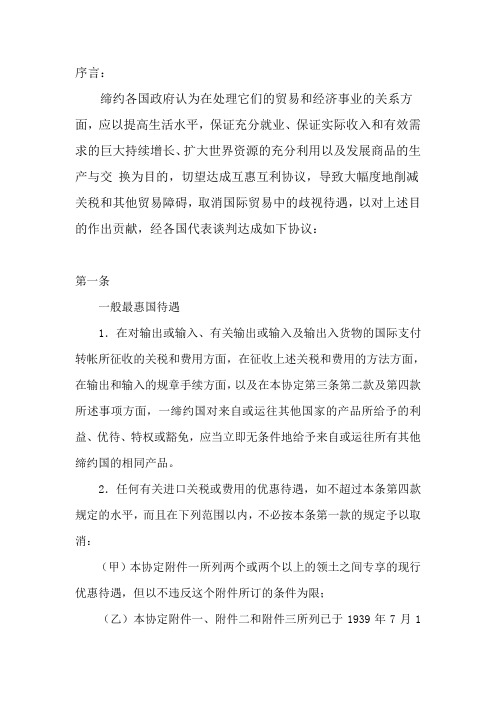
序言:缔约各国政府认为在处理它们的贸易和经济事业的关系方面,应以提高生活水平,保证充分就业、保证实际收入和有效需求的巨大持续增长、扩大世界资源的充分利用以及发展商品的生产与交换为目的,切望达成互惠互利协议,导致大幅度地削减关税和其他贸易障碍,取消国际贸易中的歧视待遇,以对上述目的作出贡献,经各国代表谈判达成如下协议:第一条一般最惠国待遇1.在对输出或输入、有关输出或输入及输出入货物的国际支付转帐所征收的关税和费用方面,在征收上述关税和费用的方法方面,在输出和输入的规章手续方面,以及在本协定第三条第二款及第四款所述事项方面,一缔约国对来自或运往其他国家的产品所给予的利益、优待、特权或豁免,应当立即无条件地给予来自或运往所有其他缔约国的相同产品。
2.任何有关进口关税或费用的优惠待遇,如不超过本条第四款规定的水平,而且在下列范围以内,不必按本条第一款的规定予以取消:(甲)本协定附件一所列两个或两个以上的领土之间专享的现行优惠待遇,但以不违反这个附件所订的条件为限;(乙)本协定附件一、附件二和附件三所列已于1939年7月1日以共同主权、保护关系或宗主权互相结合的两个或两个以上的领土之间专享的现行优惠待遇,但以不违反这些附件所订的条件为限;(丙)美利坚合众国和古巴共和国之间专享的现行优惠待遇;(丁)本协定附件五和附件六所列的毗邻国家之间专享的现行优惠待遇。
3.原属于奥托曼帝国后于1923年7月24日分离出来的国家之间实施的优惠待遇,如能按本协定第二十五条第五款的规定予以批准,应不受本条第一款规定的约束。
对这个问题运用本协定第二十五条第五款,应参考本协定第二十九条第一款。
4.按本条第二款可以享受优惠待遇的任何产品,如在有关减让表中未特别规定所享受的优惠就是优惠最高差额,则应按以下规定办理:(甲)对有关减让表内列明的任何产品的关税和费用,这一产品的优惠差额应不超过表列的最惠国税率与优惠税率的差额;表中对优惠税率若未作规定,应以1947年4月10日有效实施的优惠税率作为本条所称的优惠税率;表中对最惠国税率若未作规定,其差额应不超过1947年4月10日所实施的最惠国税率与优惠税率的差额;(乙)对有关减让表内未列明的任何产品的关税和费用,这一产品的优惠差额应不超过1947年4月10日所实施的最惠国税率与优惠税率的差额。
GATT1994中英
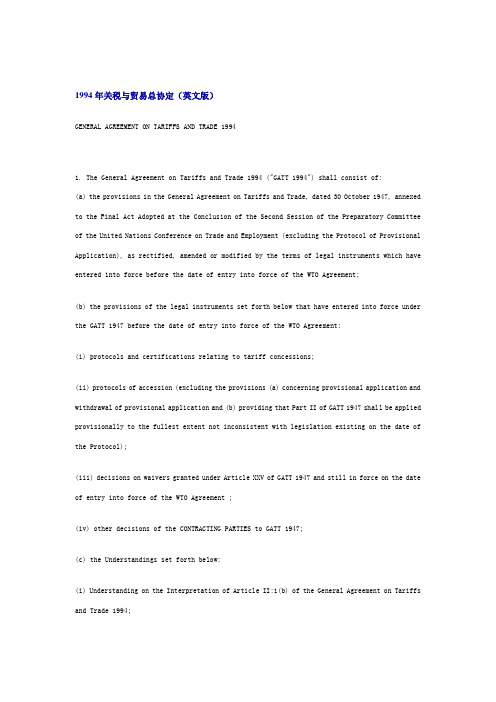
1994年关税与贸易总协定(英文版)GENERAL AGREEMENT ON TARIFFS AND TRADE 19941. The General Agreement on Tariffs and Trade 1994 ("GATT 1994") shall consist of:(a) the provisions in the General Agreement on Tariffs and Trade, dated 30 October 1947, annexed to the Final Act Adopted at the Conclusion of the Second Session of the Preparatory Committee of the United Nations Conference on Trade and Employment (excluding the Protocol of Provisional Application), as rectified, amended or modified by the terms of legal instruments which have entered into force before the date of entry into force of the WTO Agreement;(b) the provisions of the legal instruments set forth below that have entered into force under the GATT 1947 before the date of entry into force of the WTO Agreement:(i) protocols and certifications relating to tariff concessions;(ii) protocols of accession (excluding the provisions (a) concerning provisional application and withdrawal of provisional application and (b) providing that Part II of GATT 1947 shall be applied provisionally to the fullest extent not inconsistent with legislation existing on the date of the Protocol);(iii) decisions on waivers granted under Article XXV of GATT 1947 and still in force on the date of entry into force of the WTO Agreement ;(iv) other decisions of the CONTRACTING PARTIES to GATT 1947;(c) the Understandings set forth below:(i) Understanding on the Interpretation of Article II:1(b) of the General Agreement on Tariffs and Trade 1994;(ii) Understanding on the Interpretation of Article XVII of the General Agreement on Tariffs and Trade 1994;(iii) Understanding on Balance-of-Payments Provisions of the General Agreement on Tariffs and Trade 1994;(iv) Understanding on the Interpretation of Article XXIV of the General Agreement on Tariffs and Trade 1994;(v) Understanding in Respect of Waivers of Obligations under the General Agreement on Tariffs and Trade 1994;(vi) Understanding on the Interpretation of Article XXVIII of the General Agreement on Tariffs and Trade 1994; and(d) the Marrakesh Protocol to GATT 1994.2. Explanatory Notes(a) The references to "contracting party" in the provisions of GATT 1994 shall be deemed to read "Member". The references to "less-developed contracting party" and "developed contracting party" shall be deemed to read "developing country Member" and "developed country Member". The references to "Executive Secretary" shall be deemed to read "Director-General of the WTO".(b) The references to the CONTRACTING PARTIES acting jointly in Articles XV:1, XV:2, XV:8, XXXVIII and the Notes Ad Article XII and XVIII; and in the provisions on special exchange agreements in Articles XV:2, XV:3, XV:6, XV:7 and XV:9 of GATT 1994 shall be deemed to be references to the WTO. The other functions that the provisions of GATT 1994 assign to the CONTRACTING PARTIES acting jointly shall be allocated by the Ministerial Conference.(c) (i) The text of GATT 1994 shall be authentic in English, French and Spanish.(ii) The text of GATT 1994 in the French language shall be subject to the rectifications of terms indicated in Annex A to document MTN.TNC/41.(iii) The authentic text of GATT 1994 in the Spanish language shall be the text in Volume IV of the Basic Instruments and Selected Documents series, subject to the rectifications of terms indicated in Annex B to document MTN.TNC/41.3. (a) The provisions of Part II of GATT 1994 shall not apply to measures taken by a Member under specific mandatory legislation, enacted by that Member before it became a contracting party to GATT 1947, that prohibits the use, sale or lease of foreign-built or foreign-reconstructed vessels in commercial applications between points in national waters or the waters of an exclusive economic zone. This exemption applies to: (a) the continuation or prompt renewal of a non-conforming provision of such legislation; and (b) the amendment to a non-conforming provision of such legislation to the extent that the amendment does not decrease the conformity of the provision with Part II of GATT 1947. This exemption is limited to measures taken under legislation described above that is notified and specified prior to the date of entry into force of the WTO Agreement. If such legislation is subsequently modified to decrease its conformity with Part II of GATT 1994, it will no longer qualify for coverage under this paragraph.(b) The Ministerial Conference shall review this exemption not later than five years after the date of entry into force of the WTO Agreement and thereafter every two years for as long as the exemption is in force for the purpose of examining whether the conditions which created the need for the exemption still prevail.(c) A Member whose measures are covered by this exemption shall annually submit a detailed statistical notification consisting of a five-year moving average of actual and expected deliveries of relevant vessels as well as additional information on the use, sale, lease or repair of relevant vessels covered by this exemption.(d) A Member that considers that this exemption operates in such a manner as to justify a reciprocal and proportionate limitation on the use, sale, lease or repair of vessels constructed in the territory of the Member invoking the exemption shall be free to introduce such a limitation subject to prior notification to the Ministerial Conference.(e) This exemption is without prejudice to solutions concerning specific aspects of the legislation covered by this exemption negotiated in sectoral agreements or in other fora.UNDERSTANDING ON THE INTERPRETATION OF ARTICLE II:1(b)OF THE GENERAL AGREEMENT ON TARIFFS AND TRADE 1994Members hereby agree as follows:1. In order to ensure transparency of the legal rights and obligations deriving from paragraph 1(b) of Article II, the nature and level of any "other duties or charges" levied on bound tariff items, as referred to in that provision, shall be recorded in the Schedules of concessions annexed to GATT 1994 against the tariff item to which they apply. It is understood that such recording does not change the legal character of "other duties or charges".2. The date as of which "other duties or charges" are bound, for the purposes of Article II, shall be 15 April 1994. "Other duties or charges" shall therefore be recorded in the Schedules at the levels applying on this date. At each subsequent renegotiation of a concession or negotiation of a new concession the applicable date for the tariff item in question shall become the date of the incorporation of the new concession in the appropriate Schedule. However, the date of the instrument by which a concession on any particular tariff item was first incorporated into GATT 1947 or GATT 1994 shall also continue to be recorded in column 6 of the Loose-Leaf Schedules.3. "Other duties or charges" shall be recorded in respect of all tariff bindings.4. Where a tariff item has previously been the subject of a concession, the level of "other duties or charges" recorded in the appropriate Schedule shall not be higher than the level obtaining at the time of the first incorporation of the concession in that Schedule. It will be open to any Member to challenge the existence of an "other duty or charge", on the ground that no such "other duty or charge" existed at the time of the original binding of the item in question, as well as the consistency of the recorded level of any "other duty or charge" with the previouslybound level, for a period of three years after the date of entry into force of the WTO Agreement or three years after the date of deposit with the Director-General of the WTO of the instrument incorporating the Schedule in question into GATT 1994, if that is a later date.5. The recording of "other duties or charges" in the Schedules is without prejudice to their consistency with rights and obligations under GATT 1994 other than those affected by paragraph 4. All Members retain the right to challenge, at any time, the consistency of any "other duty or charge" with such obligations.6. For the purposes of this Understanding, the provisions of Articles XXII and XXIII of GATT 1994 as elaborated and applied by the Dispute Settlement Understanding shall apply.7. "Other duties or charges" omitted from a Schedule at the time of deposit of the instrument incorporating the Schedule in question into GATT 1994 with, until the date of entry into force of the WTO Agreement, the Director-General to the CONTRACTING PARTIES to GATT 1947 or, thereafter, with the Director-General of the WTO, shall not subsequently be added to it and any "other duty or charge" recorded at a level lower than that prevailing on the applicable date shall not be restored to that level unless such additions or changes are made within six months of the date of deposit of the instrument.8. The decision in paragraph 2 regarding the date applicable to each concession for the purposes of paragraph 1(b) of Article II of GATT 1994 supersedes the decision regarding the applicable date taken on 26 March 1980 (BISD 27S/24).UNDERSTANDING ON THE INTERPRETATION OF ARTICLE XVIIOF THE GENERAL AGREEMENT ON TARIFFS AND TRADE 1994Members,Noting that Article XVII provides for obligations on Members in respect of the activities of the state trading enterprises referred to in paragraph 1 of Article XVII, which are required to be consistent with the general principles of non-discriminatory treatment prescribed in GATT 1994 for governmental measures affecting imports or exports by private traders;Noting further that Members are subject to their GATT 1994 obligations in respect of those governmental measures affecting state trading enterprises;Recognizing that this Understanding is without prejudice to the substantive disciplines prescribed in Article XVII;Hereby agree as follows:1. In order to ensure the transparency of the activities of state trading enterprises, Members shall notify such enterprises to the Council for Trade in Goods, for review by the working party to be set up under paragraph 5, in accordance with the following working definition: "Governmental and non-governmental enterprises, including marketing boards, which have been granted exclusive or special rights or privileges, including statutory or constitutional powers, in the exercise of which they influence through their purchases or sales the level or direction of imports or exports."This notification requirement does not apply to imports of products for immediate or ultimate consumption in governmental use or in use by an enterprise as specified above and not otherwise for resale or use in the production of goods for sale.2. Each Member shall conduct a review of its policy with regard to the submission of notifications on state trading enterprises to the Council for Trade in Goods, taking account of the provisions of this Understanding. In carrying out such a review, each Member should have regard to the need to ensure the maximum transparency possible in its notifications so as to permit a clear appreciation of the manner of operation of the enterprises notified and the effect of their operations on international trade.3. Notifications shall be made in accordance with the questionnaire on state trading adopted on 24 May 1960 (BISD 9S/184-185), it being understood that Members shall notify the enterprises referred to in paragraph 1 whether or not imports or exports have in fact taken place.4. Any Member which has reason to believe that another Member has not adequately met its notification obligation may raise the matter with the Member concerned. If the matter is not satisfactorily resolved it may make a counter-notification to the Council for Trade in Goods, for consideration by the working party set up under paragraph 5, simultaneously informing the Member concerned.5. A working party shall be set up, on behalf of the Council for Trade in Goods, to review notifications and counter-notifications. In the light of this review and without prejudice to paragraph 4(c) of Article XVII, the Council for Trade in Goods may make recommendations with regard to the adequacy of notifications and the need for further information. The working party shall also review, in the light of the notifications received, the adequacy of the above-mentioned questionnaire on state trading and the coverage of state trading enterprises notified under paragraph 1. It shall also develop an illustrative list showing the kinds of relationships between governments and enterprises, and the kinds of activities, engaged in by these enterprises, which may be relevant for the purposes of Article XVII. It is understood that the Secretariat will provide a general background paper for the working party on the operations of state trading enterprises as they relate to international trade. Membership of the working party shall be open to all Members indicating their wish to serve on it. It shall meet within a year of the date of entry into force of the WTO Agreement and thereafter at least once a year. It shall report annually to the Council for Trade in Goods.UNDERSTANDING ON THE BALANCE-OF-PAYMENTS PROVISIONSOF THE GENERAL AGREEMENT ON TARIFFS AND TRADE 1994Members,Recognizing the provisions of Articles XII and XVIII:B of GATT 1994 and of the Declaration on Trade Measures Taken for Balance-of-Payments Purposes adopted on 28 November 1979 (BISD 26S/205-209, referred to in this Understanding as the "1979 Declaration") and in order to clarify such provisions ;Hereby agree as follows:Application of Measures1. Members confirm their commitment to announce publicly, as soon as possible, time-schedules for the removal of restrictive import measures taken for balance-of-payments purposes. It is understood that such time-schedules may be modified as appropriate to take into account changes in the balance-of-payments situation. Whenever a time-schedule is not publicly announced by a Member, that Member shall provide justification as to the reasons therefor.2. Members confirm their commitment to give preference to those measures which have the least disruptive effect on trade. Such measures (referred to in this Understanding as "price-based measures") shall be understood to include import surcharges, import deposit requirements or other equivalent trade measures with an impact on the price of imported goods. It is understood that, notwithstanding the provisions of Article II, price-based measures taken for balance-of-payments purposes may be applied by a Member in excess of the duties inscribed in the Schedule of that Member. Furthermore, that Member shall indicate the amount by which the price-based measure exceeds the bound duty clearly and separately under the notification procedures of this Understanding.3. Members shall seek to avoid the imposition of new quantitative restrictions for balance-of-payments purposes unless, because of a critical balance-of-payments situation, price-based measures cannot arrest a sharp deterioration in the external payments position. In those cases in which a Member applies quantitative restrictions, it shall provide justification as to the reasons why price-based measures are not an adequate instrument to deal with the balance-of-payments situation. A Member maintaining quantitative restrictions shall indicate insuccessive consultations the progress made in significantly reducing the incidence and restrictive effect of such measures. It is understood that not more than one type of restrictive import measure taken for balance-of-payments purposes may be applied on the same product.4. Members confirm that restrictive import measures taken for balance-of-payments purposes may only be applied to control the general level of imports and may not exceed what is necessary to address the balance-of-payments situation. In order to minimize any incidental protective effects, a Member shall administer restrictions in a transparent manner. The authorities of the importing Member shall provide adequate justification as to the criteria used to determine which products are subject to restriction. As provided in paragraph 3 of Article XII and paragraph 10 of Article XVIII, Members may, in the case of certain essential products, exclude or limit the application of surcharges applied across the board or other measures applied for balance-of-payments purposes. The term "essential products" shall be understood to mean products which meet basic consumption needs or which contribute to the Member''s effort to improve its balance-of-payments situation, such as capital goods or inputs needed for production. In the administration of quantitative restrictions, a Member shall use discretionary licensing only when unavoidable and shall phase it out progressively. Appropriate justification shall be provided as to the criteria used to determine allowable import quantities or values.Procedures for Balance-of-Payments Consultations5. The Committee on Balance-of-Payments Restrictions (referred to in this Understanding as the "Committee") shall carry out consultations in order to review all restrictive import measures taken for balance-of-payments purposes. The membership of the Committee is open to all Members indicating their wish to serve on it. The Committee shall follow the procedures for consultations on balance-of-payments restrictions approved on 28 April 1970 (BISD 18S/48-53, referred to in this Understanding as "full consultation procedures"), subject to the provisions set out below.6. A Member applying new restrictions or raising the general level of its existing restrictions by a substantial intensification of the measures shall enter into consultations with the Committee within four months of the adoption of such measures. The Member adopting such measures may requestthat a consultation be held under paragraph 4(a) of Article XII or paragraph 12(a) of Article XVIII as appropriate. If no such request has been made, the Chairman of the Committee shall invite the Member to hold such a consultation. Factors that may be examined in the consultation would include, inter alia, the introduction of new types of restrictive measures for balance-of-payments purposes, or an increase in the level or product coverage of restrictions.7. All restrictions applied for balance-of-payments purposes shall be subject to periodic review in the Committee under paragraph 4(b) of Article XII or under paragraph 12(b) of Article XVIII, subject to the possibility of altering the periodicity of consultations in agreement with the consulting Member or pursuant to any specific review procedure that may be recommended by the General Council.8. Consultations may be held under the simplified procedures approved on 19 December 1972 (BISD 20S/47-49, referred to in this Understanding as "simplified consultation procedures") in the case of least-developed country Members or in the case of developing country Members which are pursuing liberalization efforts in conformity with the schedule presented to the Committee in previous consultations. Simplified consultation procedures may also be used when the Trade Policy Review of a developing country Member is scheduled for the same calendar year as the date fixed for the consultations. In such cases the decision as to whether full consultation procedures should be used will be made on the basis of the factors enumerated in paragraph 8 of the 1979 Declaration. Except in the case of least-developed country Members, no more than two successive consultations may be held under simplified consultation procedures.Notification and Documentation9. A Member shall notify to the General Council the introduction of or any changes in the application of restrictive import measures taken for balance-of-payments purposes, as well as any modifications in time-schedules for the removal of such measures as announced under paragraph 1. Significant changes shall be notified to the General Council prior to or not later than 30 days after their announcement. On a yearly basis, each Member shall make available to the Secretariat a consolidated notification, including all changes in laws, regulations, policystatements or public notices, for examination by Members. Notifications shall include full information, as far as possible, at the tariff-line level, on the type of measures applied, the criteria used for their administration, product coverage and trade flows affected.10. At the request of any Member, notifications may be reviewed by the Committee. Such reviews would be limited to the clarification of specific issues raised by a notification or examination of whether a consultation under paragraph 4(a) of Article XII or paragraph 12(a) of Article XVIII is required. Members which have reasons to believe that a restrictive import measure applied by another Member was taken for balance-of-payments purposes may bring the matter to the attention of the Committee. The Chairman of the Committee shall request information on the measure and make it available to all Members. Without prejudice to the right of any member of the Committee to seek appropriate clarifications in the course of consultations, questions may be submitted in advance for consideration by the consulting Member.11. The consulting Member shall prepare a Basic Document for the consultations which, in addition to any other information considered to be relevant, should include: (a) an overview of the balance-of-payments situation and prospects, including a consideration of the internal and external factors having a bearing on the balance-of-payments situation and the domestic policy measures taken in order to restore equilibrium on a sound and lasting basis; (b) a full description of the restrictions applied for balance-of-payments purposes, their legal basis and steps taken to reduce incidental protective effects; (c) measures taken since the last consultation to liberalize import restrictions, in the light of the conclusions of the Committee; (d) a plan for the elimination and progressive relaxation of remaining restrictions. References may be made, when relevant, to the information provided in other notifications or reports made to the WTO. Under simplified consultation procedures, the consulting Member shall submit a written statement containing essential information on the elements covered by the Basic Document.12. The Secretariat shall, with a view to facilitating the consultations in the Committee, preparea factual background paper dealing with the different aspects of the plan for consultations. In the case of developing country Members, the Secretariat document shall include relevant background and analytical material on the incidence of the external trading environment on thebalance-of-payments situation and prospects of the consulting Member. The technical assistance services of the Secretariat shall, at the request of a developing country Member, assist in preparing the documentation for the consultations.Conclusions of Balance-of-Payments Consultations13. The Committee shall report on its consultations to the General Council. When full consultation procedures have been used, the report should indicate the Committee''s conclusions on the different elements of the plan for consultations, as well as the facts and reasons on which they are based. The Committee shall endeavour to include in its conclusions proposals for recommendations aimed at promoting the implementation of Articles XII and XVIII:B, the 1979 Declaration and this Understanding. In those cases in which a time-schedule has been presented for the removal of restrictive measures taken for balance-of-payments purposes, the General Council may recommend that, in adhering to such a time-schedule, a Member shall be deemed to be in compliance with its GATT 1994 obligations. Whenever the General Council has made specific recommendations, the rights and obligations of Members shall be assessed in the light of such recommendations. In the absence of specific proposals for recommendations by the General Council, the Committee''s conclusions should record the different views expressed in the Committee. When simplified consultation procedures have been used, the report shall include a summary of the main elements discussed in the Committee and a decision on whether full consultation procedures are required.UNDERSTANDING ON THE INTERPRETATION OF ARTICLE XXIVOF THE GENERAL AGREEMENT ON TARIFFS AND TRADE 1994Members,Having regard to the provisions of Article XXIV of GATT 1994;Recognizing that customs unions and free trade areas have greatly increased in number and importance since the establishment of GATT 1947 and today cover a significant proportion of world trade;Recognizing the contribution to the expansion of world trade that may be made by closer integration between the economies of the parties to such agreements;Recognizing also that such contribution is increased if the elimination between the constituent territories of duties and other restrictive regulations of commerce extends to all trade, and diminished if any major sector of trade is excluded;Reaffirming that the purpose of such agreements should be to facilitate trade between the constituent territories and not to raise barriers to the trade of other Members with such territories; and that in their formation or enlargement the parties to them should to the greatest possible extent avoid creating adverse effects on the trade of other Members;Convinced also of the need to reinforce the effectiveness of the role of the Council for Trade in Goods in reviewing agreements notified under Article XXIV, by clarifying the criteria and procedures for the assessment of new or enlarged agreements, and improving the transparency of all Article XXIV agreements;Recognizing the need for a common understanding of the obligations of Members under paragraph 12 of Article XXIV;Hereby agree as follows:1. Customs unions, free-trade areas, and interim agreements leading to the formation of a customs union or free-trade area, to be consistent with Article XXIV, must satisfy, inter alia, the provisions of paragraphs 5, 6, 7 and 8 of that Article.Article XXIV:52. The evaluation under paragraph 5(a) of Article XXIV of the general incidence of the duties and other regulations of commerce applicable before and after the formation of a customs union shall in respect of duties and charges be based upon an overall assessment of weighted average tariff rates and of customs duties collected. This assessment shall be based on import statistics for a previous representative period to be supplied by the customs union, on a tariff-line basis and in values and quantities, broken down by WTO country of origin. The Secretariat shall compute the weighted average tariff rates and customs duties collected in accordance with the methodology used in the assessment of tariff offers in the Uruguay Round of Multilateral Trade Negotiations. For this purpose, the duties and charges to be taken into consideration shall be the applied rates of duty. It is recognized that for the purpose of the overall assessment of the incidence of other regulations of commerce for which quantification and aggregation are difficult, the examination of individual measures, regulations, products covered and trade flows affected may be required.3. The "reasonable length of time" referred to in paragraph 5(c) of Article XXIV should exceed 10 years only in exceptional cases. In cases where Members parties to an interim agreement believe that 10 years would be insufficient they shall provide a full explanation to the Council for Trade in Goods of the need for a longer period.Article XXIV:64. Paragraph 6 of Article XXIV establishes the procedure to be followed when a Member forminga customs union proposes to increase a bound rate of duty. In this regard Members reaffirm that the procedure set forth in Article XXVIII, as elaborated in the guidelines adopted on 10 November 1980 (BISD 27S/26-28) and in the Understanding on the Interpretation of Article XXVIII of GATT 1994, must be commenced before tariff concessions are modified or withdrawn upon the formation of a customs union or an interim agreement leading to the formation of a customs union.5. These negotiations will be entered into in good faith with a view to achieving mutually satisfactory compensatory adjustment. In such negotiations, as required by paragraph 6 of Article XXIV, due account shall be taken of reductions of duties on the same tariff line made by other constituents of the customs union upon its formation. Should such reductions not be sufficient。
GATT1994年关贸总协定
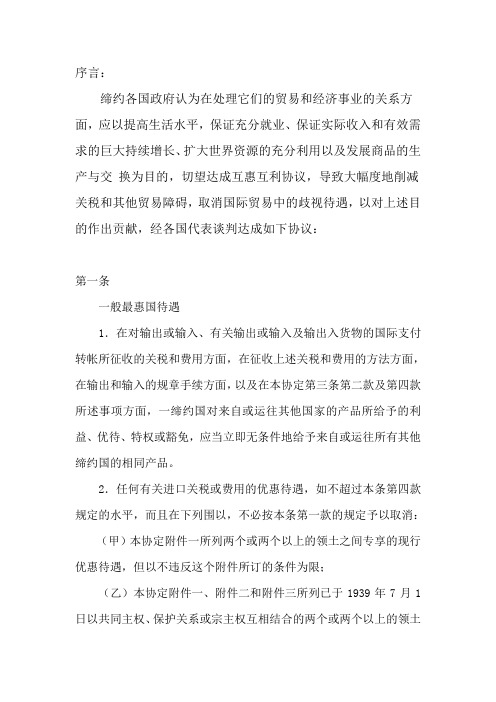
序言:缔约各国政府认为在处理它们的贸易和经济事业的关系方面,应以提高生活水平,保证充分就业、保证实际收入和有效需求的巨大持续增长、扩大世界资源的充分利用以及发展商品的生产与交换为目的,切望达成互惠互利协议,导致大幅度地削减关税和其他贸易障碍,取消国际贸易中的歧视待遇,以对上述目的作出贡献,经各国代表谈判达成如下协议:第一条一般最惠国待遇1.在对输出或输入、有关输出或输入及输出入货物的国际支付转帐所征收的关税和费用方面,在征收上述关税和费用的方法方面,在输出和输入的规章手续方面,以及在本协定第三条第二款及第四款所述事项方面,一缔约国对来自或运往其他国家的产品所给予的利益、优待、特权或豁免,应当立即无条件地给予来自或运往所有其他缔约国的相同产品。
2.任何有关进口关税或费用的优惠待遇,如不超过本条第四款规定的水平,而且在下列围以,不必按本条第一款的规定予以取消:(甲)本协定附件一所列两个或两个以上的领土之间专享的现行优惠待遇,但以不违反这个附件所订的条件为限;(乙)本协定附件一、附件二和附件三所列已于1939年7月1日以共同主权、保护关系或宗主权互相结合的两个或两个以上的领土之间专享的现行优惠待遇,但以不违反这些附件所订的条件为限;(丙)美利坚合众国和古巴国之间专享的现行优惠待遇;(丁)本协定附件五和附件六所列的毗邻国家之间专享的现行优惠待遇。
3.原属于奥托曼帝国后于1923年7月24日分离出来的国家之间实施的优惠待遇,如能按本协定第二十五条第五款的规定予以批准,应不受本条第一款规定的约束。
对这个问题运用本协定第二十五条第五款,应参考本协定第二十九条第一款。
4.按本条第二款可以享受优惠待遇的任何产品,如在有关减让表中未特别规定所享受的优惠就是优惠最高差额,则应按以下规定办理:(甲)对有关减让表列明的任何产品的关税和费用,这一产品的优惠差额应不超过表列的最惠国税率与优惠税率的差额;表中对优惠税率若未作规定,应以1947年4月10日有效实施的优惠税率作为本条所称的优惠税率;表中对最惠国税率若未作规定,其差额应不超过1947年4月10日所实施的最惠国税率与优惠税率的差额;(乙)对有关减让表未列明的任何产品的关税和费用,这一产品的优惠差额应不超过1947年4月10日所实施的最惠国税率与优惠税率的差额。
1994年关税与贸易协定(GATT1994)
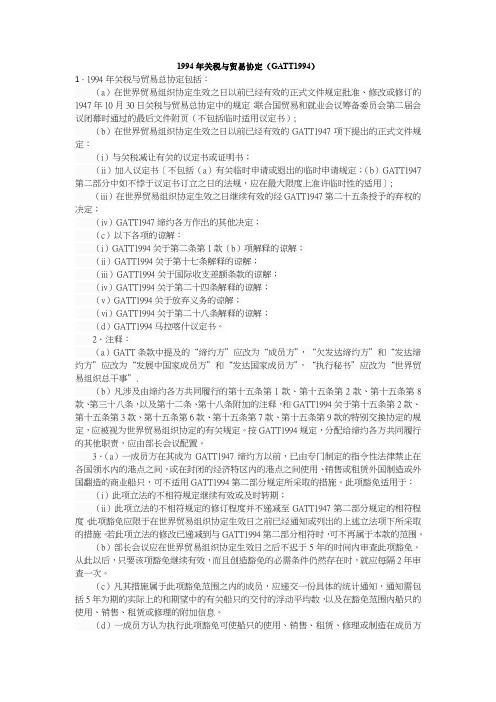
1994年关税与贸易协定(GATT1994)1.1994年关税与贸易总协定包括:(a)在世界贸易组织协定生效之日以前已经有效的正式文件规定批准、修改或修订的1947年10月30日关税与贸易总协定中的规定;联合国贸易和就业会议筹备委员会第二届会议闭幕时通过的最后文件附页(不包括临时适用议定书);(b)在世界贸易组织协定生效之日以前已经有效的GATT1947项下提出的正式文件规定:(i)与关税减让有关的议定书或证明书;(ii)加入议定书[不包括(a)有关临时申请或退出的临时申请规定;(b)GATT1947第二部分中如不悖于议定书订立之日的法规,应在最大限度上准许临时性的适用];(iii)在世界贸易组织协定生效之日继续有效的经GATT1947第二十五条授予的弃权的决定;(iv)GATT1947缔约各方作出的其他决定;(c)以下各项的谅解:(i)GATT1994关于第二条第1款(b)项解释的谅解;(ii)GATT1994关于第十七条解释的谅解;(iii)GATT1994关于国际收支差额条款的谅解;(iv)GATT1994关于第二十四条解释的谅解;(v)GATT1994关于放弃义务的谅解;(vi)GATT1994关于第二十八条解释的谅解;(d)GATT1994马拉喀什议定书。
2.注释:(a)GATT条款中提及的“缔约方”应改为“成员方”,“欠发达缔约方”和“发达缔约方”应改为“发展中国家成员方”和“发达国家成员方”,“执行秘书”应改为“世界贸易组织总干事”.(b)凡涉及由缔约各方共同履行的第十五条第1款、第十五条第2款、第十五条第8款、第三十八条,以及第十二条、第十八条附加的注释,和GATT1994关于第十五条第2款、第十五条第3款、第十五条第6款、第十五条第7款、第十五条第9款的特别交换协定的规定,应被视为世界贸易组织协定的有关规定。
按GATT1994规定,分配给缔约各方共同履行的其他职责,应由部长会议配置。
1994关税与贸易总协定中文
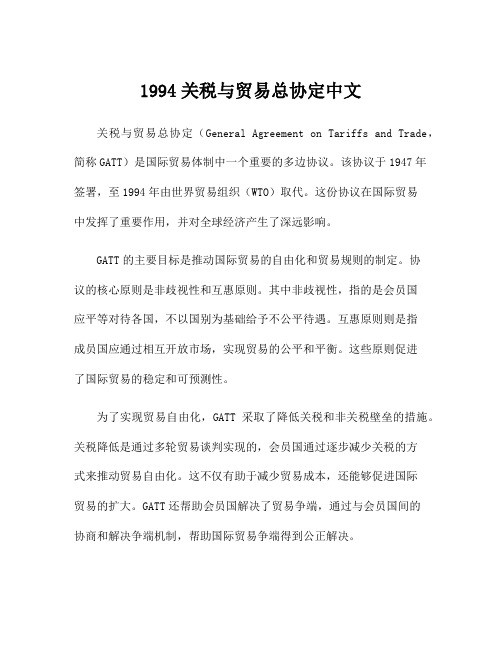
1994关税与贸易总协定中文关税与贸易总协定(General Agreement on Tariffs and Trade,简称GATT)是国际贸易体制中一个重要的多边协议。
该协议于1947年签署,至1994年由世界贸易组织(WTO)取代。
这份协议在国际贸易中发挥了重要作用,并对全球经济产生了深远影响。
GATT的主要目标是推动国际贸易的自由化和贸易规则的制定。
协议的核心原则是非歧视性和互惠原则。
其中非歧视性,指的是会员国应平等对待各国,不以国别为基础给予不公平待遇。
互惠原则则是指成员国应通过相互开放市场,实现贸易的公平和平衡。
这些原则促进了国际贸易的稳定和可预测性。
为了实现贸易自由化,GATT采取了降低关税和非关税壁垒的措施。
关税降低是通过多轮贸易谈判实现的,会员国通过逐步减少关税的方式来推动贸易自由化。
这不仅有助于减少贸易成本,还能够促进国际贸易的扩大。
GATT还帮助会员国解决了贸易争端,通过与会员国间的协商和解决争端机制,帮助国际贸易争端得到公正解决。
除了贸易的自由化,GATT还规定了贸易的准则和规则。
协议禁止国家采取一些限制贸易的手段,例如贸易补贴和限制进口等。
同时,GATT还规定了特殊和差别待遇条款,允许发展中国家采取一些特殊政策和措施,以促进其经济发展。
这些规则和条款有助于维护公平和公正的国际贸易秩序。
1994年,GATT进一步演变为世界贸易组织。
与GATT相比,WTO拥有更为广泛的职能和更具体的规则。
WTO继承了GATT的核心原则,但在农业、知识产权保护、服务贸易等方面进行了进一步的规定。
此时,WTO成为了一个更为全面和具权威性的国际贸易组织。
遗憾的是,GATT及其后继WTO在推动贸易自由化方面仍面临许多挑战。
一些国家采取保护主义政策,设置障碍和限制国际贸易。
此外,一些贸易争端也难以得到公正解决。
然而,GATT及WTO的目标始终是推动全球贸易的开放和公平,并为国际贸易提供可预测的法律框架。
WTO关于关税与非关税措施的法律制度
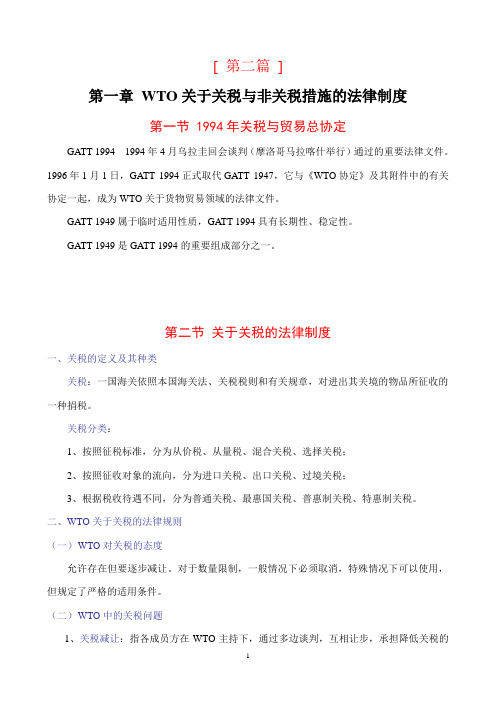
[ 第二篇]第一章WTO关于关税与非关税措施的法律制度第一节 1994年关税与贸易总协定GATT 1994 1994年4月乌拉圭回会谈判(摩洛哥马拉喀什举行)通过的重要法律文件。
1996年1月1日,GATT 1994正式取代GATT 1947,它与《WTO协定》及其附件中的有关协定一起,成为WTO关于货物贸易领域的法律文件。
GATT 1949属于临时适用性质,GATT 1994具有长期性、稳定性。
GATT 1949是GATT 1994的重要组成部分之一。
第二节关于关税的法律制度一、关税的定义及其种类关税:一国海关依照本国海关法、关税税则和有关规章,对进出其关境的物品所征收的一种捐税。
关税分类:1、按照征税标准,分为从价税、从量税、混合关税、选择关税;2、按照征收对象的流向,分为进口关税、出口关税、过境关税;3、根据税收待遇不同,分为普通关税、最惠国关税、普惠制关税、特惠制关税。
二、WTO关于关税的法律规则(一)W TO对关税的态度允许存在但要逐步减让。
对于数量限制,一般情况下必须取消,特殊情况下可以使用,但规定了严格的适用条件。
(二)W TO中的关税问题1、关税减让:指各成员方在WTO主持下,通过多边谈判,互相让步,承担降低关税的义务。
约束税率:列入关税减让表中的某种产品的关税税率。
2、关税待遇:任何成员方给予源自任何其他成员方的商品的待遇必须符合其所做出的承诺。
承诺指关税减让表中的承诺。
3、关税减让表修订:规定了严格的条件。
第三节关于海关估价的法律制度一、国际贸易中的海关估价问题海关估价:是指一国海关机构,根据法定的价格标准和程序,为征收关税而对进口货物确定一种完税价格的行为或过程。
《海关估价协定》(《关于实施1994年关贸总协定第七条的协定》)的主要内容:1、海关估价的规则,规定了估价的6种价格:成交价格、相同货物成交价格、类似货物成交价格、扣除价格、计算价格和其他估价方法,这6种方法应依次使用。
- 1、下载文档前请自行甄别文档内容的完整性,平台不提供额外的编辑、内容补充、找答案等附加服务。
- 2、"仅部分预览"的文档,不可在线预览部分如存在完整性等问题,可反馈申请退款(可完整预览的文档不适用该条件!)。
- 3、如文档侵犯您的权益,请联系客服反馈,我们会尽快为您处理(人工客服工作时间:9:00-18:30)。
中国审计报/2002年/07月/31日/
1994年关税与贸易总协定
兰兰
1947年10月30日达成的关税与贸易总协定的条款,以及世界贸易组织成立前对这些条款的修正,在 乌拉圭回合一揽子协议中被称为!1947年关税与贸易总协定∀(GATT1947),而与之对应, 乌拉圭回合重新修订并适用的有关条款则被统称为!1994年关税与贸易总协定∀(GAT T1994)。
GATT1994来源于GAT T1947,吸收了其实质内容,但却并不是简单的继承,而是有所创新与发展。
GAT T1994主要由以下几个方面的内容所组成:第一,!1947年关税与贸易总协定∀的各项条款,但不包括!临时适用议定书∀。
第二,世界贸易组织成立前的关税减让议定书,各缔约方的加入议定书,根据GATT1947所给予的且仍然有效的豁免,以及缔约方全体作出的其他决定。
第三, 乌拉圭回合达成的解释GATT1947有关条款的6个谅解,比如!关于解释1994年关税与贸易总协定第2条第1款(6)项的谅解∀,!关于1994年关税与贸易总协定国际收支条款的谅解∀等。
第四,!1994年关税与贸易总协定马拉喀什议定书∀。
世界贸易组织货物贸易多边协定主要由!1994年关税与贸易总协定∀和有关货物贸易领域的12个具体协议组成。
GATT1994是世贸组织法律框架的重要组成部分,WTO的许多重要原则,如最惠国待遇原则、国民待遇原则、透明度原则等均在这里有明确体现。
同时,GATT1994也是货物贸易领域其他各项协议的原则与基础。
!1994年关税与贸易总协定∀的主要条款包括以下各项内容:
一、最惠国待遇和国民待遇
作为世贸组织最重要基石的这两大待遇原则,其最主要、最直接的体现即是在货物贸易领域。
在货物贸易领域,最惠国待遇原则要求成员方给予任何其他国家产品的关税优惠,或其他与产品贸易有关的优惠、优待、特权或豁免,均应立即和无条件地给予其他成员方的相同产品。
GAT T1994中有关国民待遇条款,要求各成员方给予进口产品的待遇,不低于本国同类产品所享受的待遇。
在货物贸易领域,国民待遇原则是普遍适用的,但也有个别例外。
比如关于政府采购、对某种产品的国内生产者给予补贴等,但要符合相关协议的协定。
此外关于进口电影片放映数量的规定,也可以违背国民待遇。
二、透明度要求GATT1994中有关透明度条款,要求各成员公布或公开其制定与实施的同货物贸易有关的法律、法规、政策和措施及其变化情况。
三、关税减让关税是关贸总协定惟一允许各成员使用的保护国内产业的手段,但在GATT中要求各成员方通过谈判逐渐降低关税水平,并对其加以约束。
经过8轮多边贸易谈判, 乌拉圭回合之后,发达国家的工业品平均关税税率从6.3%降至3.8%,其承诺关税约束的税号占全部税号的比例由78%上升到99%,其中零关税的税号占32%;发展中成员工业品的平均关税税率则由
20.5%降至14.4%,约束关税税号比例由21%上升至73%。
四、取消数量限制GATT1994中有关取消数量限制条款,要求成员不得对产品的进出口设立或维持除关税、国内税及其他费用以外的禁止或限制措施,包括不能以配额、许可证等措施来限制
或禁止商品的进出口。
关贸总协定第11条第1款规定: 任何缔约国除征收关税和其他税费外,不得设立或维持配额、进出口许可证或其他措施以限制或禁止其他缔约国领土的产品的输入,或向其他缔约国领土输出或销售出口产品。
当然,取消数量限制原则,在特定情况下也可以允许有例外,但成员方在采取数量限制时必须遵循非歧视原则。
五、贸易救济措施该条款对成员方在采取反倾销、反补贴、保障措施等方面的权利和义务作了具体规定。
六、例外与免责规定当成员方在无法履行正常义务的特殊情况下,可以援引例外与免责规定。
例外规定包括一般例外和安全例外。
GATT1994第20条规定了10种一般例外措施:1.为保护公共道德所必需的措施;2.为保护人类、动植物的生命或健康所必需的措施;3.与黄金或白银进出口有关的措施;4.为保证与GATT1994不相抵触的国内法律、法规得到遵守所必需的措施;5.与监狱囚犯产品有关的措施;6.为保护具有艺术、历史或考古价值的国宝所采取的措施;7.保护可用竭的自然资源的措施,但此类措施应与限制国内生产或消费一同实施;8.为履行任何政府间商品协定项下义务而实施的措施,且其他成员方对该商品协定不持异议;9.在政府实施稳定计划,而采取的原料出口限制措施;10.在供应短缺下,为获取或分配产品所必须采取的措施。
而安全例外则是允许成员方在战争、外交关系恶化等紧急情况下,为保护国家安全利益采取必要的行动,对其他相关成员不履行其承诺的关税减让、取消数量限制等基本义务。
此外, GATT1994还规定了紧急限制进口措施、保护幼稚产业措施、国际收支限制措施、有关承诺修改或撤回、义务豁免等免责规定。
七、其他特殊条款GATT1994还规定了国营贸易、关税同盟和自由贸易区、对发展中成员的特殊待遇等条款。
八、争端解决条款在成员间发生贸易争端时,如何解决争端及争端解决所适用的程序等该条款作了具体规定。
